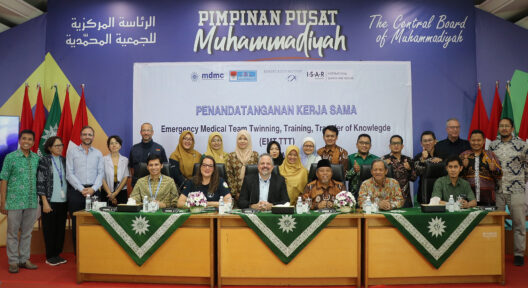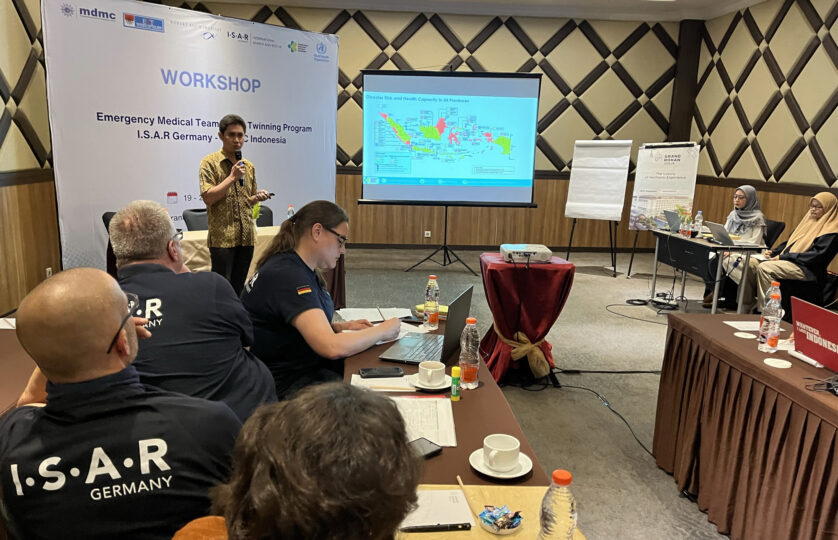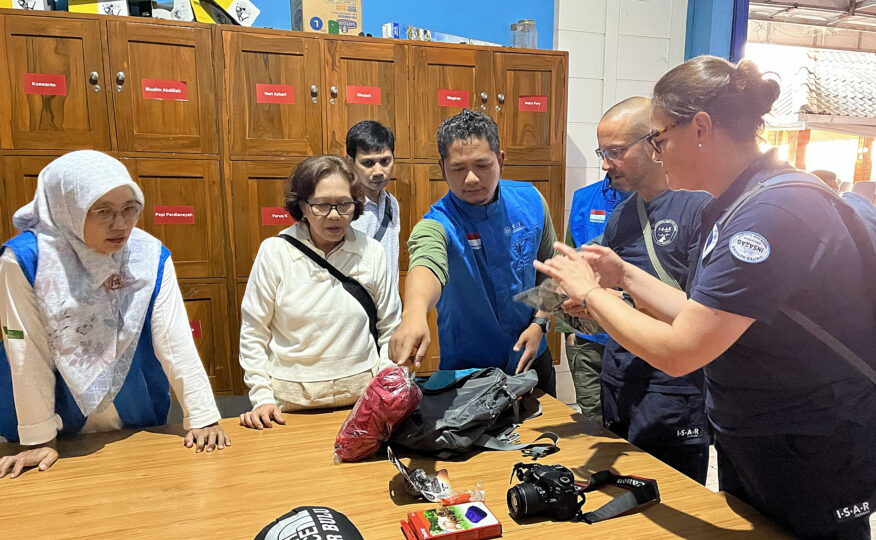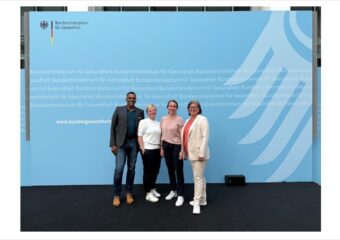Emergency Medical Teams from Germany and Indonesia develop roadmap for further cooperation
Since 2020, the Emergency Medical Teams of I.S.A.R. Germany and MDMC from Indonesia have been supporting each other within the framework of the WHO EMT Twinning concept. With the visit of I.S.A.R. to the Indonesian partners in September 2023, the cooperation entered the second round. A report from Yogyakarta.

From 19 to 21 September 2023, representatives of the Emergency Medical Teams (EMTs) I.S.A.R. Germany and Muhammadiyah Disaster Management Center (MDMC) from Indonesia met for a joint workshop in the city of Yogyakarta, Indonesia. The meeting contributed to the project “Emergency Medical Teams Twinning, Training, Transfer of Knowledge” (EMT TTT) as part of the Global Health Protection Programme (GHPP). It aimed to deepen the cooperation between the organisations and to draw up an activity plan for the project period until the end of 2025.
The German-Indonesian partnership between I.S.A.R. and MDMC was established at the beginning of the first programme phase of GHPP in 2020 by the team of the German National Focal Point for Emergency Medical Teams (EMT NFP) in the unit ZIG 3 at the Robert Koch Institute (RKI). It is based on the EMT Twinning concept of the World Health Organization (WHO) which brings together WHO-classified EMTs – in this case from Germany – with international teams that are in the process of an EMT establishment or classification. Through peer-to-peer support and mutual learning, Twinning aims to improve cooperation in the field of emergency preparedness and response along strengthening national EMT capacity.
As an effective planning process requires a multi-stakeholder participation, representatives from the WHO Country Office Indonesia, the South-East Asia Regional Office of WHO and the Indonesian Ministry of Health also joined the workshop in Yogyakarta which was organised and accompanied by the RKI project team.
Learning from each other in the Pacific Ring of Fire
Due to the geolocation of Indonesia, earthquakes, tsunamis, or volcanic eruptions are natural phenomena that frequently hit the country, causing sudden onset disasters (SODs). This was the introductory background of the Indonesian crisis health management presented by the Indonesian Ministry of Health opening the first day of the workshop. The schedule of the first day continued with exchanging on lessons learned from past missions, such as the Türkiye earthquake response in February 2023 where both organisations were deployed. Day one was further complemented by presentations and discussions on technical EMT topics concerning logistics and emergency deployment procedures.
On the second day of the workshop, the guests from Germany travelled together with the partners to the MDMC warehouse, followed by a visit to a hospital in the Gamping district run by the MDMC umbrella organisation Muhammadiyah. The hospital houses the medications storage for MDMC’s EMT operations. MDMC explained their procurement and mobilisation set-up of medications. In the afternoon, back to the workshop venue, technical and operational areas of collaboration were identified for the project implementation period. As part of the Twinning planning, the teams wish to focus on opportunities for a joint response in the field, where EMTs being deployed to the same location can maximise their response through mutual support in diverse areas; from equipment to expertise. Training activities, both online and on-site, were also discussed as part of future Twinning activities, targeting topics such as logistics, WASH (water, sanitation and hygiene promotion) and midwifery/mother and child care in the field.
Day three of the meeting marked the ceremonial signing of the cooperation agreement between the participating organisations including RKI. The ceremony was held in one of the Muhammadiyah headquarters, accompanied by a press conference with the Central Board of the organisation. This was followed by consolidating ideas from teams and wrapping up the EMT Twinning planning session. The workshop programme ended with an interactive feedback session to jointly reflect on the last three days, what was learned, enjoyed, and can be done better next time.
Packing up with a plan to take it forward
Knowing that they had successfully intensified the cooperation with the partner organisations, the travellers from Germany were ready to set off on their return journey. Upon return, the discussion results from the meeting were translated into an EMT Twinning roadmap to guide the implementation process for the remaining project period.





